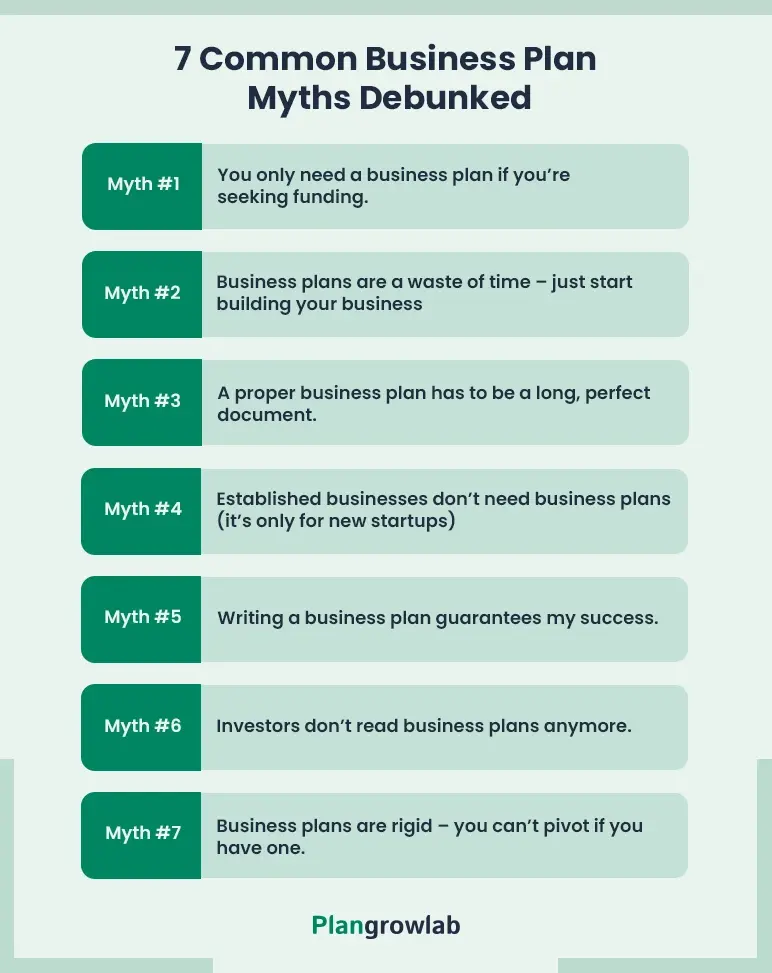If you’ve been in the business world long enough, you’ve probably heard a few strong opinions about business plans.
Some say they’re outdated. Others treat them like a formality. And then there are those who think you only need one if you're pitching to investors.
I’ve heard all of it, from early-stage founders, seasoned business owners, even folks inside large companies. And in most cases, these myths are the reason they delay planning, underprepare, or move forward with a plan that’s not really a plan.
The truth is a good business plan isn’t about the document as well as the decisions behind it. And the myths surrounding it usually come from people who’ve never actually used one to run or grow a business.
In this blog, I’m breaking down the most common myths I’ve heard over the years and explaining what actually holds up when you're in the thick of building something real.
7 Common Business Plan Myths Debunked
Nearly 90% of startups fail, with only 10% surviving beyond their first year. One major reason is poor strategies, often fueled by wrong beliefs and business plan myths that can steer you off course.
Hence, we’ll debunk these myths to help you build a stronger, more effective plan.

Myth #1: “You only need a business plan if you’re seeking funding.”
This is one of the most common misconceptions I hear and it usually comes from founders who’ve only ever seen a business plan as a funding requirement.
But here’s what I’ve seen over and over again: The most focused, adaptable teams I’ve worked with all have one thing in common—a working plan they use internally, even when they’re not raising money.
The truth is, the plan isn’t just for investors. It’s for you. It’s what keeps you clear on:
- Where you’re heading
- What are your goals
- How you’ll deal with obstacles
- What steps do you need to take next
Sure, if you’re asking for funding, investors will ask for it. But even if you’re self-funding, having a plan keeps you focused and saves you from making blind decisions.
Myth #2: “Business plans are a waste of time – just start building your business!”
Being a business plan writer, I’ve heard this so many times. People get so excited about their idea that they think, “Forget the plan, let’s just start!” And honestly, it’s the quickest way to run into trouble.
The truth is—rushing into business without a plan is like setting out on a road trip without knowing where you’re going, how much fuel you have, or which turns you’ll need to take.
You might be moving, but you don’t know if you’re heading towards your goal or a dead end.

I’ve seen businesses wasting thousands of dollars and years of effort on businesses with no direction. A simple plan could’ve saved them half that pain. So, no: Business plan isn’t a waste of time, but starting blindly is.
For a deeper understanding, check out our blog on the reasons you need a business plan to start your business.
Myth #3: “A proper business plan has to be a long, perfect document.”
A business plan doesn’t need to be a thick, flawless file with fancy words and corporate jargon. That’s another myth people love to believe.
The truth is, your business plan just needs to be clear and useful, not lengthy.
Clients often ask how long a business plan should be. In our consulting work, we’ve seen some of the most effective plans come in at just 5–7 pages. In a few cases, a one-page business plan covered everything it needed to and helped the founder move forward with clarity.
It’s never about how long it is. What really matters in a business plan is your:
- Business goals
- Market and customers
- Business model
- Competition
- Risks and challenges
That’s it. No one cares about how polished or perfect your grammar is if your plan doesn’t make sense.

Myth #4: “Established businesses don’t need business plans (it’s only for new startups).”
Many business owners often think that once a business is up and running, they can toss the business plan in a drawer and never look at it again. Big mistake!
A business plan isn’t just a one-time thing you make when you start. It’s a living, breathing guide that should grow with your business.
From what I’ve seen, the businesses that stay sharp and make better long-term decisions are the ones that treat their plan as a living tool, not a static document.
Markets change, customer needs shift, new competitors enter, and unexpected problems show up.
If you don’t update your plan, you’ll be stuck using yesterday’s ideas for tomorrow’s challenges.
So no, business plans aren’t just for startups. They’re for anyone serious about growing, staying ahead, and making smart, timely decisions—whether you’ve been in business for 2 months or 20 years.
An old house still needs fresh paint, right? Same with a business plan.
Curious about when and how often to revise your business plan? Visit our blog on how often you should update your business plan to find out the ideal frequency for keeping your plan up to date.
Myth #5: “Writing a business plan guarantees my success.”
Let me be very clear—a business plan is a map, not magic. Just because you’ve written it down doesn’t mean things will automatically work out.
It’s like buying new running shoes and assuming you’ll win the race without training. The shoes help, but you still have to run.
In our work with founders, we’ve come across this assumption more times than I can count. The plan helps you think things through—yes. But it doesn’t replace action. It doesn’t make decisions for you. And it won’t protect you from poor execution.
The truth is: A business plan improves your chances of success because it makes you think ahead, spot risks early, and stay focused. It helps you avoid foolish mistakes and blind decisions. But at the end of the day, it’s your hard work, decisions, adaptability, and consistency that turn that plan into reality.
If you want the seed to grow, you still need to water the soil.
So don’t fall for this myth.
Write your plan, yes—but more importantly, live it, work on it, review it, and update it.
Myth #6: “Investors don’t read business plans anymore.”
People these days love saying, ‘Investors only care about pitch decks, not business plans.’ And while it’s partly true, it’s not the whole picture.
Yes, at the first meeting, an investor might only glance at your pitch deck. But if they’re serious about putting their hard-earned money into your business, they’ll want to see the full plan.

The truth is, serious investors want to know you’ve done your homework.
They’ll ask:
- How will you acquire customers?
- What’s your pricing strategy?
- What if a competitor undercuts you?
- How will you manage cash flow in a slow season?
And those answers better be thought out, and that’s where your business plan comes in.
I’ve seen cases where the pitch went well, but the deal fell apart when the investor asked for deeper numbers and strategy, and the founder had no answers.
So, investors do read business plans—not always at the start, but definitely before they write a cheque. Never skip it, thinking no one will care. The one time you don’t have it is the one time you’ll need it.
Myth #7: “Business plans are rigid – you can’t pivot if you have one.”
It’s a myth among business owners that if you make a business plan, you’re stuck with it like it’s written in stone. That’s not the case. A business plan isn’t a cage, it’s a compass. It shows you the direction. But if the weather changes, you can still adjust your route.
From my experience working with founders, the best plans are built with flexibility in mind. The markets shift, customer behavior evolves, new competitors pop up, and new opportunities come out of nowhere. The plan should help you stay focused, but it should never keep you from responding to what’s happening in real time.
I’ve worked with teams that updated their plan mid-quarter and avoided costly missteps and others that stuck rigidly to old assumptions and lost momentum.
If you’re never tweaking your business plan, you’re probably not paying close enough attention. The goal is to adapt with intention.
That’s how real businesses grow.
Bottom line
A business plan isn’t a boring formality—it’s your personal roadmap. Forget the myths. Whether you’re chasing investors, self-funding, or just trying to avoid blind mistakes, a clear, flexible plan gives you direction, discipline, and the confidence to pivot when needed.
At the end of the day, it’s not about how fancy your plan looks, it’s about how well it helps you build, grow, and manage your business. If you’re looking to build a business plan or are in search of help to write one, Plangrowlab is here to help.
Our business plan consultants have guided countless entrepreneurs in crafting solid business plans and successfully helped them secure millions of dollars in funding. Our business plan writing experts not only help you with a business plan but can also guide you in crafting pitch decks and financial projections.
Don’t fall for the myths; build your business on clarity, not assumptions.
Get in touch with our experts today!
Frequently Asked Questions
Do I really need a business plan if I’m not looking for investors or loans?
Yes. A business plan isn’t just for others—it’s for you. It keeps your ideas organized, helps you stay focused, and guides your decisions.
How long should my business plan be?
As long as the business plan needs to explain your idea clearly. It can be one page or 20—clarity matters more than length.
How often should I update my business plan?
At least once a year, or whenever you face major changes like new products, shifting markets, or growth opportunities.
Can I use a one-page business plan or a business model canvas instead of a traditional plan?
Yes, if it covers your key points clearly and keeps you focused, it works. Use what suits your stage and style.
Do investors or lenders actually read business plans nowadays, or just pitch decks?
They’ll glance at your pitch deck first, but before investing serious money, they’ll want to see your full plan and numbers. Always have it ready.


